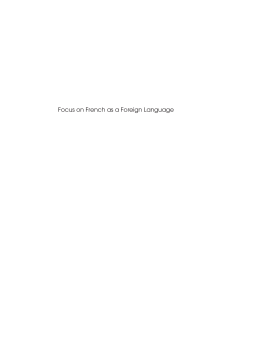
Additional Information
Book Details
Abstract
This book offers sharp new insights into the acquisition and use of French as a foreign language. The authors are specialists in their particular theoretical paradigms and focus on morphology, morpho-syntax, syntax, discourse, as well as fluency in the French interlanguage from beginners to advanced learners with different first languages.
One of the qualities of the volume, in addition to the extensive bibliographies that accompany each chapter, is the generally thorough and clear exposition of the research questions, theoretical framework, and previous work that relate to each topic. Thus, the volume should be of interest not only to SLA researchers but also to practitioners in French language education and to those who teach research methods.
Betsy Kerr, University of Minnesota-Twin Cities
This well-written, detailed, and diverse collection of articles draws strength from the varied backgrounds and perspectives of its contributing authors. A definite must read!
Katherine Rehner, Ontario Institute for Studies in Education, University of Toronto
Dewaele succeeds in creating a collection that unites approaches that are often divergent. Impressively, the volume remains cohesive, and this cohesiveness is largely due to another feature of the collection that highlights it multidisciplinary goal.
Amanda C. Edmonds, Indiana University
Focus on French as a Foreign Language greatly contributes to our knowledge of student mastery of the various components of French at early and advanced stages of their learning. Both foreign language teachers and second language acquisition research can profit from the abundant data on the interlanguage (s) of students of French.
Kenneth H. Rogers, University of Rhode Island
Jean-Marc Dewaele is Reader in French and Applied Linguistics at Birkbeck College, University of London. His research focuses on individual differences in second language production, linking linguistic and temporal variables with psychological, situational and sociobiographical variables. He is a co-editor of Bilingualism: Beyond Basic Principles (2003, Multilingual Matters) and is currently Scientific Commissions Co-ordinator and member of the Executive Board of the International Association of Applied Linguistics (AILA).
Table of Contents
| Section Title | Page | Action | Price |
|---|---|---|---|
| Contents | v | ||
| Chapter 1 Psycholinguistic Studies on the Acquisition of French as a Second Language: The ‘Learner Variety’ Approach | 1 | ||
| Chapter 2 Discourse Structuring in Advanced L2 French: The Relative Clause | 17 | ||
| Chapter 3 Adverbs and Functional Categories in L1 and L2 Acquisition of French | 36 | ||
| Chapter 4 The Emergence and Use of thePlus- Que-Parfait in Advanced French Interlanguage | 63 | ||
| Chapter 5 The Emergence of Morpho-syntactic Structure in French L2 | 88 | ||
| Chapter 6 Syntactic and Semantic Issues in the Acquisition of Negation in French | 114 | ||
| Chapter 7 Gender and Number in French L2: Can We Find Out More About the Constraints on Production in L2? | 135 | ||
| Chapter 8 The Development of Gender Attribution and Gender Agreement in French: A Comparison of Bilingual First and Second Language Learners | 164 | ||
| Chapter 9 From Speech Community Back to Classroom: What Variation Analysis Can Tell Us About the Role of Context in the Acquisition of French as a Foreign Language | 191 | ||
| Chapter 10 The Role of Psycholinguistic Factors in the Development of Fluency Amongst Advanced Learners of French | 210 | ||
| Index | 240 |
